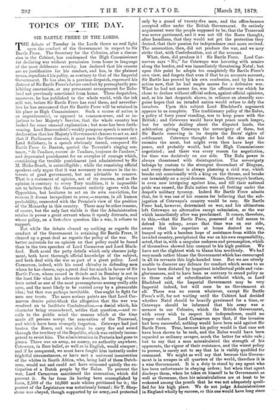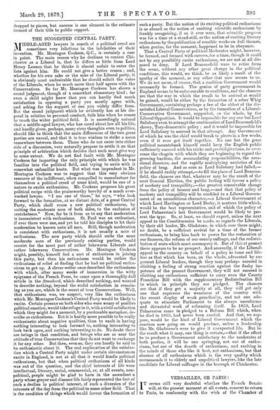TOPICS OF THE DAY.
SIR BARTLE FRERE IN THE LORDS.
THE debate of Tuesday in the Lords threw no real light upon the conduct of the Government in respect to Sir Bartle Frere. The Secretary for the Colonies, after a discus- sion in the Cabinet, has condemned the High Commissioner for declaring war without permission from home in language of the most deliberate severity, has declared that his reasons are no justification for his conduct, and has, in the plainest terms, repudiated his policy, as contrary to that of the Imperial Government. He has also, in a previous despatch, expressed his distrust of Sir Bartle Frere's future conduct by peremptorily pro- hibiting annexation, or any permanent arrangement for Zulu- land not previously sanctioned from home. These despatches, moreover, he has published to the whole world, with the ink still wet, before Sir Bartle Frere has read them, and neverthe- less he has announced that Sir Bartle Frere will be retained in his place as High Commissioner. Such a course of action is so unpredecented, so opposed to common-sense, and so in- jurious to her Majesty's Service, that the whole country has looked for some unusual explanation ; but none has been forth- coming. Lord Beaconsfield's weakly pompous speech is merely a declaration that her Majesty's Government chooses to act so, and that if Parliament dissents it must turn the Government out. Lord Salisbury, in a speech obviously forced, compared Sir Bartle Frere to Danton, quoted the Terrorist's ringing sen- tence, "de l'audace, encore de l'audace, toujours de l'audace," and deprecated punishment for an overplus of courage which, .considering the terrible punishment just administered by Sir M. Hicks-Beach, is unintelligible ; while the remaining official speakers only argue that it was necessary to censure in the in- terests of good government, but not advisable to remove. That is a statement of opinion, not of its reasons, and as the opinion is contrary to every Tory tradition, it is impossible not to believe that the Government entirely agrees with the Opposition, but hesitates to act on its own conviction, for reasons it deems inexpedient to avow,—reasons, in all human probability, connected with the Premier's view of the position of the Monarchy in this country. There may be other reasons, of course, but the only fact visible is that the Administration retains in power a great servant whom it openly distrusts, and whose policy, on a first-class question like a war, it refuses to support.
But while the debate cleared up nothing as regards the conduct of the Government in retaining Sir Bartle Frere, it cleared up a great deal as regards the policy of the war. No better materials for an opinion on that policy could be found than in the two speeches of Lord Carnarvon and Lord Blach- ford. Both avoid the petty details which only obscure judg- ment, both have thorough official knowledge of the subject, and both deal with the war as part of a great policy. Lord Carnarvon, indeed, with his usual chivalry in defending men whom he has chosen, says a great deal too much in favour of Sir Bartle Frere, whose record in Scinde and in Bombay is not in the least like what his advocate describes, he having always been noted as one of the most presumptuous among really able men, and the most likely to be carried away by a pleasurable idea; but that was perhaps inevitable. One ought to fight for men one trusts. The more serious points are that Lord Car- narvon denies point-blank the allegation that the war was resolved on to facilitate Confederation,—a denial which, his character being remembered, settles that question,—and re- calls to the public mind the reasons which at the time made all persons accept the annexation of the Transvaal, and which have been strangely forgotten. Cetewayo had just beaten the Boers, and was about to carry fire and sword through the territory of the Republic, which was entirely incom- petent to resist him. The administration in Pretoria had gone to pieces. There was no army, no money, no authority anywhere. Cetewa.vo, in Boer belief, as well as in English, would conquer ; and if he conquered, we must have fought him instantly under frightful circumstances, or have met a universal insurrection of the whites in South Africa, who, being half of them Dutch- men, would not and could not have witnessed quietly the ex- tirpation of a Dutch people by the Zulus. To prevent the war, Lord Carnarvon sanctioned the annexation, which did prevent it. So far from its having been accomplished by force, 2,500 of the 10,000 male whites petitioned for it ; the protest of the Legislature was notoriously formal ; Sir T. Shop- stone was obeyed, though supported by no army, and protected only by a guard of twenty-five men, and the office-bearers accepted office under the British Government. So entirely acquiescent were the people supposed to be, that the Transvaal. was never garrisoned, and it was not till the Boers thought, after Isandlana, that they would not get the protection they desired, that their passion for independence once more revived.. The annexation, then, did not produce the war, and we may strike that, with Confederation, out of the account.
What, then, did produce it ? Sir Bartle Frere. Lord Car- narvon says "No," for Cetewayo was hovering with armies. along the border, and was immediately threatening Natal ; but upon this point he adopts too completely Sir Bartle Frere's own view, and forgets that even if that be an accurate account, Sir Bartle has proved by his own confession, and by his own action now, that he had ample means for a defensive war. What he had not means for, was the offensive war which he chose to declare without official orders, against official opinions,. and, as his last despatch shows, in reliance on absurdly san- guine hopes that an invaded nation would refuse to defy the invaders. Upon this subject Lord Blachford's argument appears to us complete. The traditionary policy of the Zulus, a policy of forty years' standing, was to keep peace with the British ; and Cetewayo would have kept peace much longer, but for unfair dealing about the disputed lands, the arbitration giving Cetewayo the sovereignty of them, but Sir Bartle reserving in its despite the Boers' rights of settlement. Cetewayo thought he had the skin and his enemies the meat, but might even then have kept the peace, and probably would, had the High Commissioner negotiated ; and there was every reason for negotiation, for time was decisively on our side. The Zulu power is, always threatened with disintegration. The sovereignty belongs by custom to the strongest descendant of Dingaan, and every descendant is always planning a civil war, which breaks out occasionally with a king on the throne, and breaks. out invariably on a royal decease. Ohame, Cetewayo's brother, is even now intriguing against him, and till their national pride was roused, the Zulu nation were all fretting under the military tyranny. Indeed Sir Bartle Frere admits that, for it was one of his reasons for believing that the sub- jugation of Cetewayo's country would be easy. Sir Bartle Frere had, however, determined on war, and his ultimatum. left Cetewayo no alternative except submission, or the war which immediately after was proclaimed. It comes, therefore, to this,—that Sir Bartle Frere, possessed of full means to defend his colony, aware that time was on our side,, aware that his superiors at home desired no war, buoyed up with a baseless hope of assistance from within the invaded country, precipitated the war on his own responsibility,. acted, that is, with a sanguine rashness and presumption, which of themselves showed him unequal to his high position. We have not the slightest wish to blame him needlessly. We ha& very much rather blame the Government whieh has encouraged in all its servants this high-handed tone. But we are utterly unable to discover any defence for conduct which seems to us. to have been dictated by impatient intellectual pride and vain- gloriousness, and to have been as contrary to sound policy as to those rules of subordination without which, as Lord' Blachford said, the Imperial Government may be very- Imperial indeed, but will soon be no Government at all. There was no reason whatever, except Sir Bartle Frere's will, for not waiting until the Cabinet had decided whether Natal should be heavily garrisoned for a time, or- Cetewayo should be informed that his army was a menace to our Colonies, which the British Government, with every wish to respect his independence, could no- longer endure. Lord Carnarvon says that, if the invasion had been successful, nothing would have been said against Sir Bartle Frere. True, because his policy would in that case not- have been shown to be rash, and the Zulus would have been regarded as ordinary savages, much the better for white rule ; but to say that a man miscalculated the strength of his opponents, the vigour of their resistance, and the wisest policy to pursue, is surely not to say that he is visibly qualified for command. We might as well say that because this Govern- ment is in scrapes in all quarters of the world, therefore it is. a wise Government. It is a duty to stand by any agent who has been unfortunate in obeying orders ; but when that agent disobeys them, when he takes on himself to be Government as well as Governor, then his miscalculations are at least to be reckoned among the proofs that he was not adequately quali- fied for his high place. We do not judge Administrations in England wholly by success, or this one would have long sines dropped to pieces, but success is one element in the estimate formed of their title to public support.



































 Previous page
Previous page